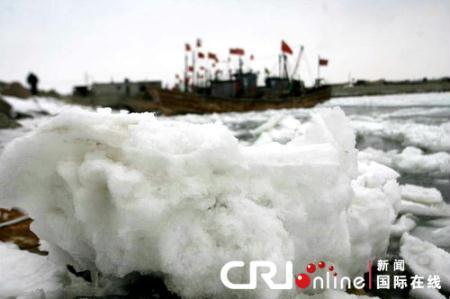| Videos | ? Latest |
|
? Feature | ? Sports | ? Your Videos |
Turning sea ice into drinking water
Scientists are surveying the Bohai Sea's frozen waters in an attempt to squeeze something good out of the recent winter weather disaster. Their findings may enable them to turn desalinated ice into drinkable water.

At a harbor near the city of Dalian, scientists are extracting samples from the frozen surface. The temporary passage created by their icebreaker freezes again within minutes.
Chen Weibin, Division Director of National Maritime Env. Mon. Center, said, "The ice is getting thicker. The biggest chunk measures more than 40 centimeters."
The researchers are carrying spectrum analyzers, water quality indicators, and even radar reflectors to study the ice. The salt in the frozen chunks weighs as much as one-sixth of an equivalent amount of sea water. Scientists say it's actually much easier to remove salt from sea ice than from water.
Professor Gu Wei, from Beijing Normal University, said, "Our estimation puts the current sea ice reserve in the Bohai area at around 20 billion cubic meters. If we're able to tap into it, we can then overcome the water shortages in the country's costal cities."
But for soldiers protecting China's border islands, sea ice means trouble. The troops haven't seen a single transporter ship for a long time. Every warm day is a chance to send in some provisions.
Yan Zhibo, Vice Commander of Transporter Ship Convoy, said, "It's been nearly a month since our last mission. We can't wait to set sail right now, because more freezing days are ahead."
The convoy was carrying correspondence as well. The guards on the islands have been craving letters from home since maritime traffic was cut off.
Liu Han, fresh recruit, said, "Finally! A letter for me! I prepared my reply even before receiving it. I'm also sending postcards to my family."
Weather forecasters say the freezing conditions in the area around the Bohai Sea are expected to worsen, due to recent cold snaps. Maritime traffic departments have mobilized additional icebreakers to help keep the aquatic lanes open.
 0
0 






